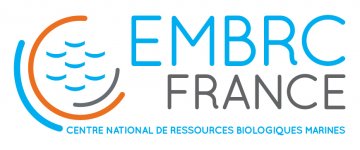PhD position in metabolomics and functional genomics of halogenation mechanisms in brown algae
Document(s)
Download the position offer
General information:
Workplace: Roscoff Biological Station, France Publication date of the offer : 2 June 2023
Scientific supervisors: Catherine Leblanc et Soizic Prado Contract type: Doctoral contract (CDD)
Contract period: 36 months
Start date of the thesis: September/October 2023 Proportion of work: Full time
Salary: 2 135,00 € gross monthly
Description of the thesis project
Objective and subject scientific field and themes.
The halogen metabolism is thought to play a unique role in the biology of macroalgae, but the biosynthetic pathways, the chemical nature and the biological roles of halogenated compounds in vivo are poorly described. The HALOGENE project is interested in the evolution and role of this metabolism in brown algae, through the study of key halogenating enzymes. These enzymes include vanadium- dependent haloperoxidases (vHPOs) which were discovered more than thirty years ago in a brown alga and form large multigenic families in this eukaryotic lineage (1). vHPOs catalyse the oxidation of halides in the presence of hydrogen peroxide to produce a reactive intermediate, which can halogenate various substrates. They could be involved in oxidative detoxification, cell wall reinforcement and the production of halogenated compounds during abiotic and biotic defence responses (2). However, the physiological substrates for vHPOs have not been identified, and their biological role has yet to be validated in brown algae.
This PhD research project aims at studying the biochemical role of vHPOs and at deciphering the biosynthetic pathways of halogenated compounds in a model brown alga, Ectocarpus siliculosus, by combining functional genomics and metabolomics approaches. A recently developed protocol for switching off the expression of target genes using the CRISPR-Cas9 method (3) has generated several knock-out (KO) mutants of the vHPO gene in Ectocarpus. By studying these mutants and by comparing them with wild-type strains, this thesis project will analyse the contribution of this enzyme to halogenation processes in this brown alga species. The first step will be to validate the loss of protein activity using crude protein extracts, and then to optimise the chemical extraction conditions and analysis methods for profiling the whole halogenated metabolome by mass spectrometry (LC-MS) (4). The metabolomic profiles of the different strains will be compared, in laboratory cultures under standard conditions or submitting to oxidative stress. Halogenated metabolites will be detected thanks to their isotopic mass using Haloseeker-type tools, annotated and characterised using molecular network-type approaches and using natural product and internal databases. Their biosynthesis will be further explored in vitro by incubating putative substrates, commercially available, with algal protein extracts. Transcriptomic analyses will also be carried out on the different strains in culture, and the combination of metabolomic and transcriptomic data will be used to decipher the main metabolic pathways linked to halogen metabolism.
Expected results and valorisation of the PhD student's research work
This research project will lead to original results on the chemical nature of halogenated compounds in a model brown alga and the characterisation of the biochemical functions of halogenation enzymes and of the corresponding biosynthetic pathways.
References.
- Leblanc et al. (2015) Vanadium haloperoxidases: from the discovery 30 years ago to X-Ray crystallographic and V K-edge absorption spectroscopic studies. Coordination Chemistry Reviews, 301–302, 134–146. doi.org/10.1016/j.ccr.2015.02.013
- La Barre et al. (2010) The Halogenated Metabolism of Brown Algae (Phaeophyta), Its Biological Importance and Its Environmental Significance. Marine Drugs 8(4), 988-1010. doi.org/10.3390/md8040988
- Badis et al. (2021) Targeted CRISPR-Cas9-based gene knockouts in the model brown alga Ectocarpus. New Phytol, 231: 2077-2091. doi.org/10.1111/nph.17525
- Roullier et al. (2016) Automated Detection of Natural Halogenated Compounds from LC-MS Profiles–Application to the Isolation of Bioactive Chlorinated Compounds from Marine-Derived Fungi. Anal. Chem. 2016, 88, 18, 9143– 9150. https://doi.org/10.1021/acs.analchem.6b02128
Work context
This PhD thesis will be carried out in the context of the HALOGENE project (2022-2026), funded by the French National Research Agency (ANR) and involving the 'Biology of Algae and Interactions with the Environment' (ABIE) and 'Genetics of Macroalgae' teams from the Laboratory of Integrative Biology of Marine Models (LBI2M, UMR8227, Sorbonne University-CNRS) in Roscoff and the team headed by Soizic Prado at the National Museum of Natural History (MCAM, UMR7245, CNRS-MNHN) in Paris. This thesis work will be co-directed by Catherine Leblanc (DR CNRS HDR, ABIE team) and Soizic Prado (PR MNHN HDR, MCAM). Their work is related to fundamental research and based on an interdisciplinary approach, at the interface between chemistry of natural products and macroalgal functional genomics. The candidate will carry out his or her experimental work within the ABIE team with the support of the laboratory's algal culture facility in Roscoff. The metabolomic and chemical analyses (LC- and GC-MS) will be carried out jointly on the MetaboMer platform (mass spectrometry) of the FR2424 in Roscoff and on the mass spectrometry and NMR platforms of the MNHN in Paris. He or she will take part in HALOGENE project meetings, interact with the other scientists involved in this collaborative research project and benefit from the scientific dynamism of the Roscoff Biological Station.
Constraints and risks
The doctoral project will be linked to the doctoral school 227, ''Sciences de la nature et de l'Homme : évolution et écologie'' of Sorbonne Université-MNHN. The candidate will be registered at Sorbonne Université, and will benefit from the dedicated environment in terms of doctoral training and support for doctoral students. He or she will work mainly in Roscoff and will carry out short-term scientific visits at the MNHN laboratory in Paris, for metabolomics analyses.
Additional information:
We are looking for a motivated candidate with a Master or Engineering degree in chemistry or biochemistry. Knowledge or experience in metabolomics analysis would be an advantage. Applications should include a detailed CV, at least two references (likely to be contacted), a one-page covering letter and previous Master 1-2 or engineering school grades.
Applications may only be submitted via the CNRS portal: https://emploi.cnrs.fr/Offres/Doctorant/UMR8227-SOPLAB-028/Default.aspx Deadline for applications: 23 June 2023
Contact:
Catherine Leblanc (catherine.leblanc@sb-roscoff.fr) and Soizic Prado (soizic.prado@mnhn.fr)







